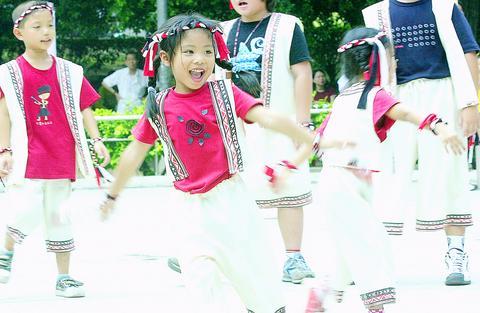While a new Hakka television station has gone on air, Aborigines are still struggling to get their own TV channel, and some prominent Aboriginal figures are blaming the Council of Indigenous Peoples for not trying hard enough.
Yesterday, the Public Television Service (PTS) held a public seminar on the issue of an exclusively Aboriginal channel. Many important Aboriginal representatives attended the seminar, including Legislator Walis-Pelin (瓦歷斯貝林), the council's education and culture section chief Wang Chiou-i (汪邱一), Taipei City Indigenous Peoples Commission Director Kung Wen-chi (孔文吉) and chief editor of the renowned Aboriginal newspaper South Island Times Lin Ming-te (林明德).

PHOTO: SEAN CHAO, TAIPEI TIMES
Article 26 of the Aborigine Education Law (原住民族教育法), passed in 2000, requires the government to assign time slots on public channels or an entire channel devoted to the continuation of Aboriginal culture and education. The council has been working to create a channel for indigenous people since the law was passed.
In 2001, the PTS, at the request of the council, came up with a proposal to set up an exclusive channel for indigenous people, but the plan then stalled.
"However, the Hakka council made a proposal for their own channel after the Aboriginal council did, and they got their channel sooner than we did," Lin said.
PTS chief of indigenous news Djanav Zengror (丹耐夫正若) said that when Yeh Chu-lan (葉菊蘭) took over as chairwoman of the Council for Hakka Affairs, she was eager to push for a Hakka channel. She borrowed the plan for an Aboriginal channel from PTS and adjusted it for the Hakka channel, Djanav said. Six months later, Hakka TV was up and running, but the Aboriginal channel remained a proposal.
"The Hakka council's boss handled things smoothly, and she always treats others with great courtesy. This should be a good lesson for the indigenous peoples council," said Chung Yu-yuang (
Kung agreed that Council of Indigenous People Chairman Chen Chien-nien (陳建年) could learn from the Council for Hakka Affairs.
"Chen could do with communicating more with the Legislative Yuan," Kung said.
Earlier this year, legislators blocked the allocation of NT$330 million toward setting up the channel because they said only 60 percent of the Aboriginal population could receive terrestrial channels. They wanted the council to solve the problem of low reception first and then work on the channel later.
Wang said that actually it was a misunderstanding on the part of the legislature because only about 20,000 families out of 140,000 had poor reception of terrestrial channels.

Alain Robert, known as the "French Spider-Man," praised Alex Honnold as exceptionally well-prepared after the US climber completed a free solo ascent of Taipei 101 yesterday. Robert said Honnold's ascent of the 508m-tall skyscraper in just more than one-and-a-half hours without using safety ropes or equipment was a remarkable achievement. "This is my life," he said in an interview conducted in French, adding that he liked the feeling of being "on the edge of danger." The 63-year-old Frenchman climbed Taipei 101 using ropes in December 2004, taking about four hours to reach the top. On a one-to-10 scale of difficulty, Robert said Taipei 101

Nipah virus infection is to be officially listed as a category 5 notifiable infectious disease in Taiwan in March, while clinical treatment guidelines are being formulated, the Centers for Disease Control (CDC) said yesterday. With Nipah infections being reported in other countries and considering its relatively high fatality rate, the centers on Jan. 16 announced that it would be listed as a notifiable infectious disease to bolster the nation’s systematic early warning system and increase public awareness, the CDC said. Bangladesh reported four fatal cases last year in separate districts, with three linked to raw date palm sap consumption, CDC Epidemic Intelligence

Taiwanese and US defense groups are collaborating to introduce deployable, semi-autonomous manufacturing systems for drones and components in a boost to the nation’s supply chain resilience. Taiwan’s G-Tech Optroelectronics Corp subsidiary GTOC and the US’ Aerkomm Inc on Friday announced an agreement with fellow US-based Firestorm Lab to adopt the latter’s xCell, a technology featuring 3D printers fitted in 6.1m container units. The systems enable aerial platforms and parts to be produced in high volumes from dispersed nodes capable of rapid redeployment, to minimize the risk of enemy strikes and to meet field requirements, they said. Firestorm chief technology officer Ian Muceus said

MORE FALL: An investigation into one of Xi’s key cronies, part of a broader ‘anti-corruption’ drive, indicates that he might have a deep distrust in the military, an expert said China’s latest military purge underscores systemic risks in its shift from collective leadership to sole rule under Chinese President Xi Jinping (習近平), and could disrupt its chain of command and military capabilities, a national security official said yesterday. If decisionmaking within the Chinese Communist Party has become “irrational” under one-man rule, the Taiwan Strait and the regional situation must be approached with extreme caution, given unforeseen risks, they added. The anonymous official made the remarks as China’s Central Military Commission Vice Chairman Zhang Youxia (張又俠) and Joint Staff Department Chief of Staff Liu Zhenli (劉振立) were reportedly being investigated for suspected “serious